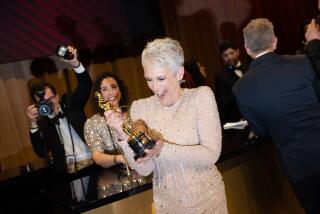Jet-Setters Toss Opulent Bash : Beijing’s New Party Line: Caviar and Champagne
- Share via
BEIJING — Under the shade trees in a courtyard that was once the pleasure ground of emperors, Humbert des Lyons de Feuchin donned a black-plumed mask Friday night and began to dance.
The Frenchman was one of 220 jet-set socialites from 21 countries who brought Beijing its first Venetian masked ball as part of a four-day, $4,300-per-person outing dubbed by its organizers “The Return of Marco Polo.”
A caviar-and-champagne lunch on the Great Wall, an eclectic concert by European and Chinese performers at the Great Hall of the People and an art auction run by Sotheby’s of London will highlight the rest of the weekend.
The event was promoted as a fund-raiser for restoration work on the Great Wall and a music room in Venice. But except for the Sunday art auction, it has instead become the most ostentatious international party in Beijing since before the Communists’ civil war victory in 1949.
“This is one more proof that China has opened the door to be more and more like Europe and America,” said Feuchin, who opened fashion designer Pierre Cardin’s elite restaurant, Maxim’s de Paris, in Beijing five years ago. Feuchin now manages a Paris hotel owned by Cardin, who was seated at the next table at the Beijing ball.
“It’s a way to get money to their country,” Feuchin said. “Why not get money for the Chinese people? Imagine all the people who worked here tonight. There is money for people who worked tonight.”
As they enjoyed the breathtakingly beautiful landscaped grounds of Diaoyutai (the Fishing Terrace), laid out as an imperial garden in the 12th Century, other party-goers appeared to be similarly at ease with the display of opulence.
The men wore dinner jackets, and the women long gowns or short dresses--some low-cut and some strapless. There were many masks of brilliantly colored feathers or silver sequins. With an 18-piece string orchestra playing for most of the evening, followed just before midnight by a rock band, the partying seemed to be up to the best Mediterranean standards.
“Other parties?” exclaimed Sonia Touret, a German resident of Paris, when asked by a reporter for comparisons. “They’re all about the same, really, which is unbelievable, because we’re in a Communist country. But I’ve heard it’s changed.”
Francois Lafon, owner of a French chemical and pharmaceutical company, said his trip to China was pure vacation, but that he intends to return again on business.
“The potential is fantastic,” Lafon declared. “They’re going very fast in everything.”
Lafon backed up his view by noting that a huge statue of Mao Tse-tung, who promoted revolutionary egalitarianism more than economic development, has recently been torn down at Beijing University.
“I think they’re much more Western-minded than in the Soviet Union,” Lafon said.
This sort of reaction appears to be part of what the Chinese had in mind when they granted approval for the weekend of events.
Former Foreign Minister Huang Hua, who showed up at a Thursday night party for the group, was asked by reporters about the propriety of China’s endorsing such a fancy party, and the political symbolism of its decision to do so.
Huang said differences of wealth in the world are “an objective reality,” and added:
“We live in one world. We need to increase mutual understanding. . . . Now we’re trying to make our country more prosperous. We need all kinds of help.”
China also hopes to get money to help with its restoration work on the Great Wall. Profits from the weekend are to be divided between that work and restoration of a music room in the San Giovanni e Paolo Hospital in Venice, according to Daniel Vial, a Paris publicist who organized the event.
At a news conference this week, Vial said the Chinese are charging so much for the unusual events scheduled for the weekend that the auction will account for the only significant fund-raising.
The auction, scheduled for Sunday morning on the grounds of what was once the Imperial Palace, will include 67 items, primarily works of Western modern art and traditional Chinese paintings. Among the items, which carry an estimated total value of about $800,000, is an ink-and-watercolor painting of plum blossoms by Deng Lin, the daughter of China’s top leader, Deng Xiaoping.
Vial said that most of the money paid by the 220 tour participants, nearly $1 million, will go for expenses. Just the rent for a section of the Great Wall for today’s caviar lunch, he said, will be $54,000.
“We were a little bit upset about the prices we are being charged,” he said. “It’s extremely expensive. . . . So, we get almost nothing from the trips themselves. The Chinese didn’t get exactly the concept of a charity, and they charge us the maximum.”
More to Read
Sign up for The Wild
We’ll help you find the best places to hike, bike and run, as well as the perfect silent spots for meditation and yoga.
You may occasionally receive promotional content from the Los Angeles Times.






